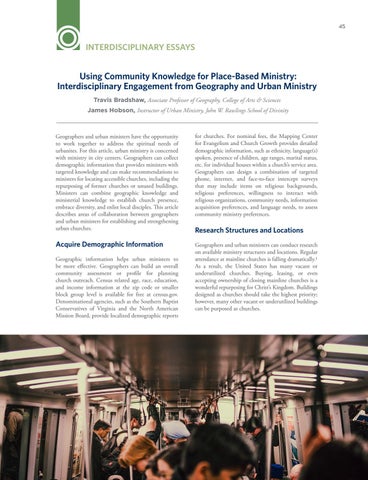45
INTERDISCIPLINARY ESSAYS
Using Community Knowledge for Place-Based Ministry: Interdisciplinary Engagement from Geography and Urban Ministry Travis Bradshaw, Associate Professor of Geography, College of Arts & Sciences James Hobson, Instructor of Urban Ministry, John W. Rawlings School of Divinity
Geographers and urban ministers have the opportunity to work together to address the spiritual needs of urbanites. For this article, urban ministry is concerned with ministry in city centers. Geographers can collect demographic information that provides ministers with targeted knowledge and can make recommendations to ministers for locating accessible churches, including the repurposing of former churches or unused buildings. Ministers can combine geographic knowledge and ministerial knowledge to establish church presence, embrace diversity, and enlist local disciples. This article describes areas of collaboration between geographers and urban ministers for establishing and strengthening urban churches.
for churches. For nominal fees, the Mapping Center for Evangelism and Church Growth provides detailed demographic information, such as ethnicity, language(s) spoken, presence of children, age ranges, marital status, etc. for individual houses within a church’s service area. Geographers can design a combination of targeted phone, internet, and face-to-face intercept surveys that may include items on religious backgrounds, religious preferences, willingness to interact with religious organizations, community needs, information acquisition preferences, and language needs, to assess community ministry preferences.
Acquire Demographic Information
Geographers and urban ministers can conduct research on available ministry structures and locations. Regular attendance at mainline churches is falling dramatically.1 As a result, the United States has many vacant or underutilized churches. Buying, leasing, or even accepting ownership of closing mainline churches is a wonderful repurposing for Christ’s Kingdom. Buildings designed as churches should take the highest priority; however, many other vacant or underutilized buildings can be purposed as churches.
Geographic information helps urban ministers to be more effective. Geographers can build an overall community assessment or profile for planning church outreach. Census related age, race, education, and income information at the zip code or smaller block group level is available for free at census.gov. Denominational agencies, such as the Southern Baptist Conservatives of Virginia and the North American Mission Board, provide localized demographic reports
Research Structures and Locations
